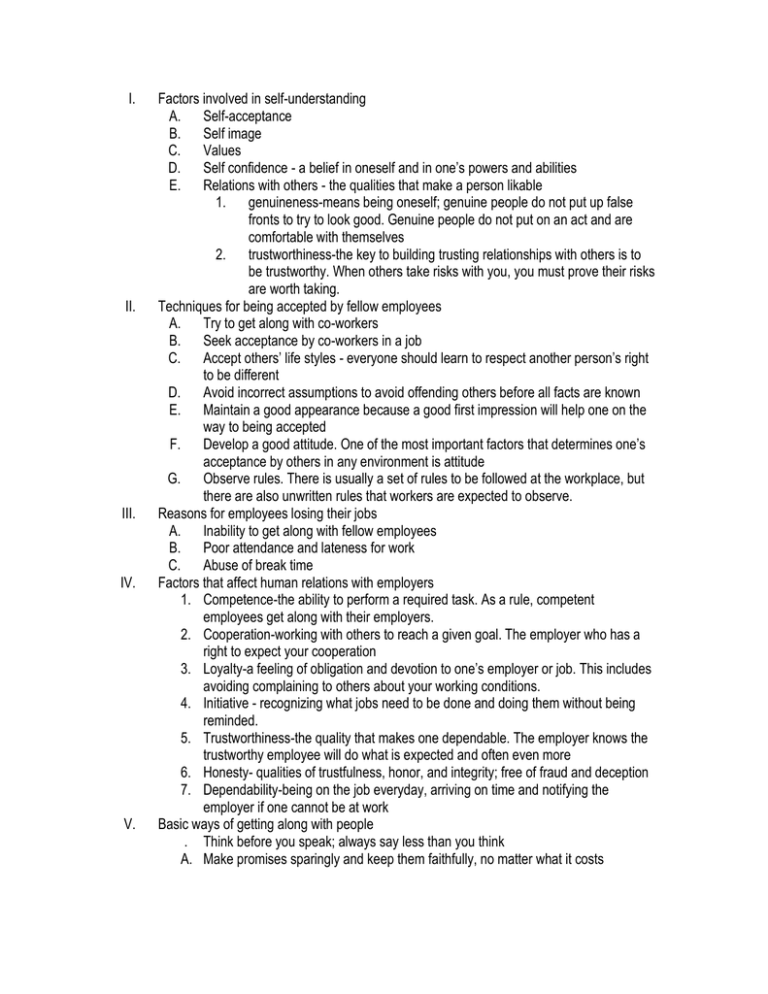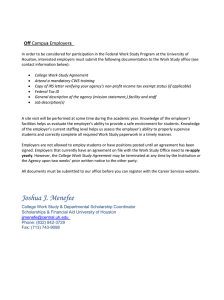I. Factors involved in self-understanding A. Self-acceptance
advertisement

I. II. III. IV. V. Factors involved in self-understanding A. Self-acceptance B. Self image C. Values D. Self confidence - a belief in oneself and in one’s powers and abilities E. Relations with others - the qualities that make a person likable 1. genuineness-means being oneself; genuine people do not put up false fronts to try to look good. Genuine people do not put on an act and are comfortable with themselves 2. trustworthiness-the key to building trusting relationships with others is to be trustworthy. When others take risks with you, you must prove their risks are worth taking. Techniques for being accepted by fellow employees A. Try to get along with co-workers B. Seek acceptance by co-workers in a job C. Accept others’ life styles - everyone should learn to respect another person’s right to be different D. Avoid incorrect assumptions to avoid offending others before all facts are known E. Maintain a good appearance because a good first impression will help one on the way to being accepted F. Develop a good attitude. One of the most important factors that determines one’s acceptance by others in any environment is attitude G. Observe rules. There is usually a set of rules to be followed at the workplace, but there are also unwritten rules that workers are expected to observe. Reasons for employees losing their jobs A. Inability to get along with fellow employees B. Poor attendance and lateness for work C. Abuse of break time Factors that affect human relations with employers 1. Competence-the ability to perform a required task. As a rule, competent employees get along with their employers. 2. Cooperation-working with others to reach a given goal. The employer who has a right to expect your cooperation 3. Loyalty-a feeling of obligation and devotion to one’s employer or job. This includes avoiding complaining to others about your working conditions. 4. Initiative - recognizing what jobs need to be done and doing them without being reminded. 5. Trustworthiness-the quality that makes one dependable. The employer knows the trustworthy employee will do what is expected and often even more 6. Honesty- qualities of trustfulness, honor, and integrity; free of fraud and deception 7. Dependability-being on the job everyday, arriving on time and notifying the employer if one cannot be at work Basic ways of getting along with people . Think before you speak; always say less than you think A. Make promises sparingly and keep them faithfully, no matter what it costs VI. VII. VIII. IX. B. Be interested in others, in their pursuits, their welfare, their homes, and families. Let all you meet, however humble, feel that you regard then as persons of importance. C. Never let an opportunity pass to say a kind and encouraging thing to or about somebody. D. Be cheerful; keep a pleasant smile on your face E. Reserve an open mind on all debatable questions. Discuss but do not argue - it is a mark of superior minds to disagree yet be friendly F. Discourage gossip and make a rule to say nothing of another unless it is something good G. Be careful of others’ feelings. Wit and humor at the other fellow’s expense are rarely worth the effort. Reasons why people work and set goals . To achieve satisfaction A. To support family B. To attain acceptance of peers C. To gain power D. To accumulate wealth Establishing human relations with patients . Learn to know, understand and relate to the patient in any situation A. Show sympathy for the patient by being eager to serve and by being of gentle touch B. Realize and understand sick people are sensitive, both emotionally and physically. Sickness causes strain and patients are not always on their best behavior. C. Remember to be kind and tolerant when patients are irritable and demanding D. Realize much of the satisfaction assistants derive from their work is due to the relation they develop with the patient. Human relations in communication . Good attitudes enhance communication A. Good communication lowers employee turnover B. Good communication eliminates misunderstanding C. Communication implies two important thinks 1. sharing means that communication involves the action of more than one person. That is, there must be one who send the message and another who react to the message 2. understanding means that both the sender and receiver of the message share the same meaning of what is said in the message. This part of communication is the most difficult because people tend to give different meanings to the same words. Human relations problems develop because of the failure of people to share and understand messages. Barriers to good communication in human relations . Human relation problems may develop because of the failure of people to share and understand messages. A. When a person uses a word, that word is used with just one meaning B. The particular meaning is what that person intend the word to mean. C. Bypassing is a barrier in communication because one single word or expression is complicated by several different meanings or several different words might have the same meaning D. Employers and employees can cause communication problems by misusing language. Two of the most serious problems that arise due to the misuse of language 1. Labeling or name-calling a. To unfairly classify someone as a certain type of person. Typical labels given to people are 1. Clown-a person who appears to do silly things 2. Troublemaker-a person who appears to be frequently involved in problems 3. Animal-a person lacking in manners 2. emotional confusion-words that mean the same thing; some have pleasant sounds while others do not. Examples: Negative Appeal 3. 4. 5. Positive Appeal a. death insurance a. life insurance b. garbage collector b. sanitary engineer c. stock salesperson c. investment counselor d. lie d. fib e. pop quiz e. unscheduled test Avoid emotional confusion in human relations by using as many positive sounding words or titles as possible. Listening-when good listeners do not understand a message, they ask the speaker for a different explanation. Good listeners must be alert. Listening is much more than hearing. The process of listening requires an active mind. Grapevine-the term dates back to the Civil War, when the United States sent secret messages by telegraph line strung through trees and bushes almost like a vine. Today, the term “grapevine” includes all forms of unofficial communication. Messages by way of the grapevine are only about 80 percent reliable.


